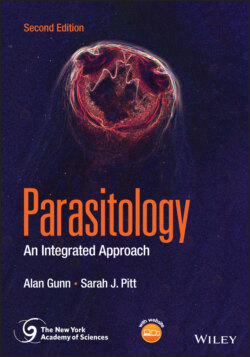Читать книгу Parasitology - Alan Gunn - Страница 2
Table of Contents
Оглавление1 Cover
2 Title Page
3 Copyright Page
4 Dedication
5 Preface
6 About the Companion Website
7 1 Animal Associations and the Importance of Parasites 1.1 Introduction 1.2 Animal Associations 1.3 Parasite Hosts 1.4 Zoonotic Infections 1.5 The Co‐evolution of Parasites and Their Hosts 1.6 Parasitism as a ‘Lifestyle’: Advantages and Limitations 1.7 The Economic Cost of Parasitic Diseases 1.8 Why Parasitic Diseases Remain a Problem
8 2 Taxonomy 2.1 Introduction 2.2 Viruses: A Special (Unresolved) Case 2.3 Taxonomic Hierarchy 2.4 Kingdom Protista 2.5 Kingdom Animalia
9 3 Parasitic Protozoa Part A: Phyla Rhizopoda, Metamonada, Apicomplexa 3.1 Introduction 3.2 Phylum Rhizopoda 3.3 Phylum Metamonada 3.4 Phylum Apicomplexa 3.5 Subclass Coccidiasina
10 4 Parasitic Protozoa Part B: Phylum Kinetoplastida; Parasitic Algae and Fungi 4.1 Introduction 4.2 Phylum Kinetoplastida 4.3 Phylum Chlorophyta 4.4 Kingdom Fungi
11 5 Platyhelminth and Acanthocephalan Parasites 5.1 Introduction 5.2 Phylum Platyhelminthes 5.3 Class Cestoda 5.4 Phylum Acanthocephala
12 6 Nematode Parasites 6.1 Introduction 6.2 Class Enoplea 6.3 Class Rhabdita
13 7 Arthropod Parasites 7.1 Introduction 7.2 Phylum Chelicerata 7.3 Phylum Crustacea 7.4 Subphylum Hexapoda
14 8 Parasite Transmission 8.1 Introduction 8.2 Contaminative Transmission 8.3 Transmission Associated with Reproduction 8.4 Autoinfection 8.5 Nosocomial Transmission 8.6 Active Parasite Transmission 8.7 Hosts and Vectors 8.8 Host Factors 8.9 Co‐Transmission and Interactions Between Pathogens 8.10 Environmental Factors
15 9 Immune Reactions to Parasitic Infections 9.1 Introduction 9.2 Invertebrate Immunity 9.3 Vertebrate Immunity 9.4 Innate Immunity to Parasites 9.5 Adaptive Immune Reactions to Parasites 9.6 Microbiomes and Host Immune Reactions to Parasites 9.7 Avoiding the Host Immune Response 9.8 Immunity to Malaria 9.9 Schistosoma spp. and Hepatitis C Virus Interactions 9.10 HIV‐AIDS and Parasitic Infections
16 10 Pathology Part A 10.1 Introduction 10.2 Factors Influencing Pathogenesis 10.3 Mechanisms By Which Parasites Cause Pathology 10.4 Types of Pathology
17 11 Pathology Part B 11.1 Introduction 11.2 Damage to Specific Organs 11.3 Co‐Infections and Pathogenesis
18 12 The Useful Parasite 12.1 Introduction: The Goodness of Parasites? 12.2 The Importance of Parasites for the Maintenance of a Healthy Immune System 12.3 The Use of Parasites to Treat Medical Conditions 12.4 Parasites as Sources of Novel Pharmaceutically Active Substances 12.5 Parasites as Biological Control Agents 12.6 Parasites as Forensic Indicators
19 13 The Identification of Protozoan and Helminth Parasites 13.1 Laboratory Testing for Parasitic Infections: Introduction 13.2 Importance of Correct Identification 13.3 Properties of an Ideal Diagnostic Test 13.4 Isolation of Parasites 13.5 Identification from Gross Morphology 13.6 Biochemical Techniques for Identification 13.7 Immunological Techniques for Identification 13.8 Molecular Techniques for Identification 13.9 Diagnostic Testing of Parasitic Infections Outside the Laboratory: Introduction
20 14 Parasite Treatment 14.1 Introduction 14.2 The Ideal Antiparasitic Drug 14.3 Pharmaceutical Drugs 14.4 DNA/RNA Technology 14.5 Molecular Chaperones (Heat Shock Proteins) 14.6 Nanotechnology 14.7 Quantum Dots 14.8 Natural Remedies 14.9 Homeopathy
21 15 Parasite Vaccines 15.1 Introduction 15.2 The Design and Use of Vaccines 15.3 Herd Immunity 15.4 Factors Limiting the Production of Commercial Antiparasitic Vaccines 15.5 Properties of an Ideal Vaccine 15.6 Types of Vaccine 15.7 Identification of Antigens for Use in Anti‐parasite Vaccines 15.8 Vaccine Delivery 15.9 Vaccines Against Malaria 15.10 Nanobodies (Single Domain Antibodies) 15.11 Problems with Vaccination Strategies
22 16 Parasite Control 16.1 Introduction 16.2 Eradication, Elimination, and Control 16.3 Education 16.4 Environmental Modification and Cultural Control 16.5 Remote Sensing and GIS Technology 16.6 Whether to Treat the Individual or the Population 16.7 Piggy‐Backing Control Programmes 16.8 Disruptions to Control Programmes 16.9 Role of Governments, Foundations, and Aid Organisations
23 References
24 Index
25 End User License Agreement
